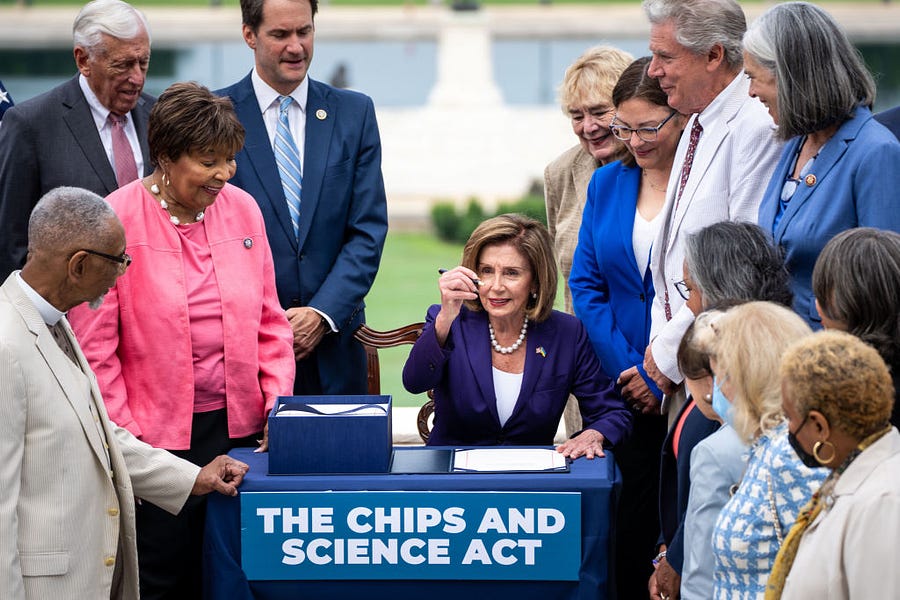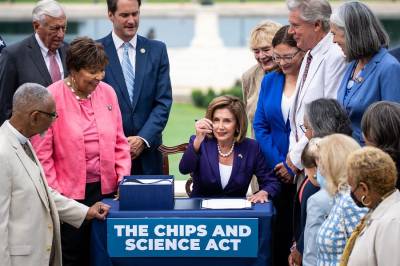Good morning. We’re looking forward to the weekend, but first, the House will consider an assault weapons ban and potentially a bill limiting ownership of big cats (no more Tiger Kings, lawmakers hope) today.
China Competition Bill Passes
Congress approved more than $52 billion in subsidies to the semiconductor chip manufacturing industry this week—the culmination of over a year of work—but not without new partisan fallout that sparked broad Republican opposition to a bill many of them had previously backed.
The CHIPS and Science Act is aimed at shoring up critical supply chains and boosting American scientific research, including through direct funding and tax breaks. It’s a sweeping package many national security experts and government officials have pushed Congress to approve for months. (Read thoughts on it from The Current’s Klon Kitchen here, and a different view from Capitolism’s Scott Lincicome here.)
The competition bill passed the Senate earlier this week with a vote of 64-33, with 17 Republicans joining Democrats to support it. It was on track to pass with broad support in the House, and it might have become a common line on the campaign trail to tout lawmakers’ bipartisan collaborative successes. But now the situation is a bit messier.
Just hours after senators sent the CHIPS measure to the House, Senate Majority Leader Chuck Schumer and West Virginia Sen. Joe Manchin announced they had come to agreement on an entirely different bill. After many fits and starts, Democratic lawmakers appear poised to advance a budget reconciliation bill—including $369 billion in funding for climate priorities, financed by tax hikes for the wealthy, along with provisions intended to reduce prescription drug prices. Most bills require 60 votes to pass in the Senate, but budget reconciliation measures procedurally require just a simple majority of 51 votes. With Vice President Kamala Harris’ tie-breaking vote, Democrats are able to pass these bills along party lines. It’s how they approved a sweeping coronavirus relief package last year, and it’s how Republicans passed their 2017 tax law.
The announcement was a surprise to almost everyone. The last public update on the talks indicated negotiators had failed to reach a deal on major components of the Democratic bill, as Manchin was concerned about high inflation. Republicans believed it would be much slimmer, if it was going to advance.
Republican senators have struck a hard line on this reconciliation bill. They especially oppose the tax hikes Democrats are using to finance their priorities. GOP lawmakers paused work on the chips and research bill earlier this summer when news reports about revived Democratic reconciliation talks emerged; only after it appeared the smaller version of the reconciliation measure was possible were they willing to go ahead with the final version of the CHIPS and Science Act.
The revelation this week that Democrats have agreed to the legislative text of their bill prompted Republicans in the House to organize against CHIPS in retaliation when it came to their chamber Thursday. They argued the new spending would cause high inflation to spiral further.
“I know we need a CHIPS bill,” Rep. Don Bacon, a Nebraska Republican, told The Dispatch’s Audrey Fahlberg, “but this is too much.”
“We wanted a Chevy and now it’s a Ferrari,” he added. He raised concerns that the spending in the semiconductor bill, paired with spending in the Democratic reconciliation bill, could “kick the economy in the gut.”
And Rep. Frank Lucas, the top Republican on the House Science, Space, and Technology Committee, said that although he worked on parts of the bill for more than three years, his calculus on spending measures changed in light of the Democratic bill. The CHIPS act, he argued, is now “irrevocably tied to a massive tax hike and spending spree.”
“Regrettably, and it’s more regrettably than you can possibly imagine, I will not be casting my vote for the CHIPS and Science Act today,” Lucas said. “I want to emphasize that this is in no way a reflection of my feelings about the transformational research policies in this bill.”
A whip operation by GOP leaders to convince their members to vote against the package wasn’t enough to sink it on Thursday night, though. It ultimately passed 243-187, with 24 Republicans voting in favor of it alongside Democrats.
One of them, Michigan Rep. Peter Meijer, said beforehand that he felt blindsided by the announcement from Manchin and Schumer about their budget reconciliation deal.
“I’m trying to subordinate the emotional and the political here,” Meijer told The Dispatch. “But it's certainly not how you win friends and influence people.”
Others who backed the competition bill said it was essential for America’s place in the world and for countering the threat of a belligerent and genocidal China.
The top Republican on the House Foreign Affairs Committee, Rep. Mike McCaul, told reporters he was “going to vote for what’s right for the country and national security.”
Oh, and: “It’s my bill. I’m not going to vote against my own bill.”
McCaul said the political fallout is unfortunate. With different timing, Republicans might have voted in stronger numbers for the competition measure. McCaul emphasized the dynamics stretch much further than domestic political jockeying.
“Guess who came out today strongly opposed to the CHIPS bill? The Chinese Communist Party,” McCaul said Thursday. “If you want to know who hates this bill, who lobbies against it: The Chinese Communist Party. Why? Because they know it’ll help us compete against them."
Manchin Reconciliation Bill: All Eyes on Sinema
Baby Lewis has been at home sick this week, so I haven’t had time to dig into the legislative text of Democrats’ reconciliation package. (Perfect weekend reading.) Luckily, my colleagues at The Morning Dispatch hit some of the highlights this morning:
If enacted, the 725-page bill would extend federal subsidies for low-income Americans’ Affordable Care Act premiums for three years and allocate $369 billion in climate spending—primarily in the form of subsidies and tax credits incentivizing U.S. consumers and businesses to shift to renewable energy sources over the next ten years. Low- and middle-income Americans, for example, would receive a $4,000 tax credit if they bought a used “clean” vehicle, and up to a $7,500 tax credit if they bought a new one. About $30 billion is set aside for grants and loans that would go to states and electric utilities so they can “accelerate the transition to clean electricity,” and more than $20 billion in grants and loans would be made available to auto manufacturers to retool existing factories—and build new ones—to pump out clean cars. Democrats have touted the package as the “single biggest climate investment” in American history, and claim it would put the United States on a path to cut emissions 40 percent from 2005 levels by 2030. (We’re currently on track to cut emissions by about 20 percent.)
Unlike the Build Back Better Act—which relied on gimmicks to artificially reduce its topline costs for accounting purposes—the Inflation Reduction Act is actually fully paid for. It would implement a 15 percent minimum tax on corporations earning in excess of $1 billion in profit—essentially eliminating deductions intended to incentivize capital investment and research and development—and chip away at the so-called “carried interest loophole” that allows wealthy investment managers to reduce their tax burden by classifying some of their earnings as capital gains rather than regular income. The legislation would also boost IRS funding by $80 billion over the next decade—in the hopes tougher enforcement would generate additional tax revenues—and save the government some money by allowing Medicare to negotiate the price of certain prescription drugs starting in 2026.
Now that Democrats have support from Manchin, they need to win backing from the other moderate holdout in their conference: Arizona Sen. Kyrsten Sinema.
Sinema hasn’t commented on the plan as her office has been reviewing it. Her vote is essential to pass the bill, as all Republicans are likely to oppose it. Sinema has publicly supported some aspects of the plan, including climate priorities, but she has been reluctant to close the “carried interest loophole” as a means to fund the bill.
Democratic leaders plan a vote on the bill as soon as next week.
“There’s a few rocks in the river in front of us because every senator, myself included, has something that I wanted in this package that’s not in it,” Delaware Democratic Sen. Chris Coons told Politico this week. “Getting through the process from here to completion is going to be an interesting run. But I’m optimistic we will get there.”
Meanwhile






Please note that we at The Dispatch hold ourselves, our work, and our commenters to a higher standard than other places on the internet. We welcome comments that foster genuine debate or discussion—including comments critical of us or our work—but responses that include ad hominem attacks on fellow Dispatch members or are intended to stoke fear and anger may be moderated.
With your membership, you only have the ability to comment on The Morning Dispatch articles. Consider upgrading to join the conversation everywhere.